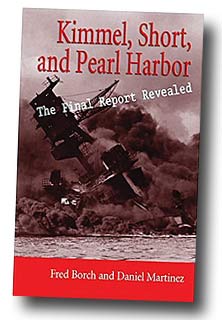Isle Pages

![]()
"Kimmel, Short and Pearl Harbor -- The Final Report Revealed"
By Fred Borch and Daniel Martinez
Naval Institute Press, $25.95
Pearl Harbor report
gives perspective on
today’s blame games
If the blame game was a disease, it would be called the Pearl Harbor Syndrome, for the overwhelming desire of officialdom to affix responsibility for disasters on individuals rather than on rigged systems. It can't be the overloaded airplane, it must be the pilot; no way it's faulty nuclear reactor engineering, it has to be someone asleep at the switch; surely, it's impossible for the current incumbent president to ignore terror-attack warnings, so it must obviously be the fault of the previous president.Following the horrible, successful Imperial Navy assault on the American fleet on Dec. 7, 1941, the nation lurched into a period of hand-wringing and finger-pointing that persists to this day. The primary scapegoats were Adm. Husband Kimmel and Gen. Walter Short, the commanders on the scene. Their supporters always thought they were treated unfairly, and a decade ago managed to get Undersecretary of Defense Edwin Dorn to revisit the issue.
The so-called "Dorn Report" discovered that the commanders had been denied crucial information and had made errors of judgment, but they were to remain the lightning rods for the attack. Because no action was taken, the Dorn Report remains controversial. It is reprinted here in full.
And it's annotated. Analysts (and government employees) Borch and Martinez -- an Army lawyer and a National Park Service historian -- have extensively footnoted and sidebarred the report, and it's fascinating reading, for those interested in the twisty ways of government as well as Pearl Harbor buffs.
Blame? The key accusation here is that Kimmel and Short relied far too much on Washington for direction and intelligence. Is this a lesson for modern times? Absolutely.
There's a tendency for Americans to blame our own shortcomings for military disasters rather than credit the enemy. At Pearl Harbor, we faced what was at that time the greatest striking force the world had ever known, and one shrouded in fanatical secrecy. The Japanese succeeded because they wanted to.
If there's another lesson here, it is this: In history, s*** happens. And those who write about it skip the blame.
[News] [Business] [Features] [Sports] [Editorial] [Do It Electric!]
[Classified Ads] [Search] [Subscribe] [Info] [Letter to Editor]
[Feedback]
